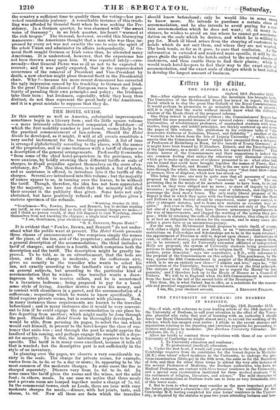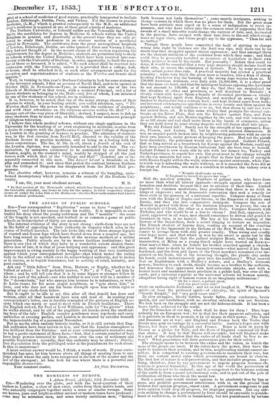THE UNIVERSITY OF DURHAM: ITS DEGREES IN MEDICINE.
Cambridge, 13th December 1853. Smt—I wish, with reference to your leading article of the 10th instant on the University of Durham, to call your attention to the effort of the Vener- able pluralist who rules that seat of learning with an authority I should fancy our Royal Chancellor might almost envy, to extend the working of the scheme, which has escaped your notice : I allude to the recent statutes and regulations relating to the standing and exercises requisite for proceeding to licences and degrees in medicine. (See Durham Unwersity Calendar. Re- gulations, lib. vi.§ 4.) Allow me briefly to contrast these regulations with those of our ancient University of Cambridge as relates
1. To University education and residence ; 2. To professional (medical) education.
1. Under the first head, I would call your attention to the fact, that while Cambridge requires from its candidates for the lowest degree in Medicine (M.B.) nine terms' school residence in the University, to undergo the pre- vious examination (little-go) in the fifth term, the same as for the Bachelors of Arts, and then for other three terms to attend the very able lectures of the several Professors of Medicine, the Durham authorities, who have no Medical Professors, are content with three terms' residence in the University, and a special easy examination instituted for these medical students " iii the rudiments of religion, literature, and science." The mild character of the Arts examinations at Durham leads one to form no very formidable idea of this lower scale. 2. But to turn to what many may consider as the more important part of the future physician's education—the professional. The candidate for the Cambridge M.B. having completed his nine terms' residence in the Univer- sity, is required by the statutes to-pass two years attending lectures and hos- London, at a school of medicine of good repute, practically interpreted to include Edinburgh, Dublin, Paris, and Vienna. For the licence to practise Diedieine, (L.111) which is granted subsequently to the M.B., an additional year's residence is required at one of these great schools of medicine. The Durham University, or I should rather say the Venerable the Warden, limits the candidates for degrees in Medicine to schools within the United Kingdom in general, and practically at the present time they are only al- loyed to study their profession in an obscure section of a provincial school in Newcastle. The certificates from the great metropolitan hospitals of London, Edinburgh, Dublin, are alike ignored.; Paris and Vienna, I fancy, they had not thought of. In the second clause of the section regulating the requirements for the degree in Medicine, students are permitted only to study in schools within the United Kingdom, which have been received into con- wane with the University of Durham : in order, apparently, to limit the num- ber of those so favoured, it is added, "No such school shall be received into connexion with the University, unless it is provided that a college, hall, or house, shall be attached to it, or such other arrangement made for the reception and superintendence of students as the Warden and Senate shall approve."
Well, in turning to this year's Durham Calendar to look for some statement of the favoured schools, I find an account of Nevill Hall, said to be opened in October 1852, in Newcastle-on-Tyne, in connexion with one of the two Schools of Medicine* in that town, with a resident Principal, and a list of eleven students as belonging to the Hall—only five of whom, I am informed by one of the students of the school, are in residence. It is, however, to be noted, that one of the many strange clauses of their statutes to which, in your leading article, you called attention, says, " The Warden shall have the power to dispense with the residence of students, and with their attendance on the religious services within the Hall" ! A strange out-of-the-way piece of liberality ; devised, I suspect, more to fish up stray students than to assert any, at Durham, otherwise unknown principle of religious toleration. I believe this whole medical scheme, without any single appliance in the University for the teaching of or even examining in medicine, to arise from a desire to compete with the Apothecaries Company and College of Surgeons in London in the granting of licences to practise. The attention of students was, in the first circular from Nevill Hall, directed to the validity of the Durham licence to practise medicine, and as being on a footing with the above corporations. The fee, 51. 108. in all, about a fourth of the cost of the London diploma, was apparently intended to add to the bait. The ex- amination, by unknown examiners to be nominated by our friend the Warden, might, in the student's mind, readily be stripped of all the just terrors with which that of the "College and hull" (London) are so in- separably connected to idle men. The Lancet let out a broadside on the plan and unmasked it ; and since that period the contrast between Durham and the College of Surgeons has disappeared from the Nevill Hall pro- gramme. The abortive effort, however, remains a witness of the bungling, unin- formed incompetency which presides at the councils of the Durham Uni- versity. I am, Sir, your most obedient servant, M. D.
• In that section of the Newcastle school, which has found favour in the eyes of the venerable pluralist, one looks in vain for the names in their respective depart- ments of either Sir John Fife or Dr. Robinson—the two Newcastle names best known to the medical profession.



































 Previous page
Previous page